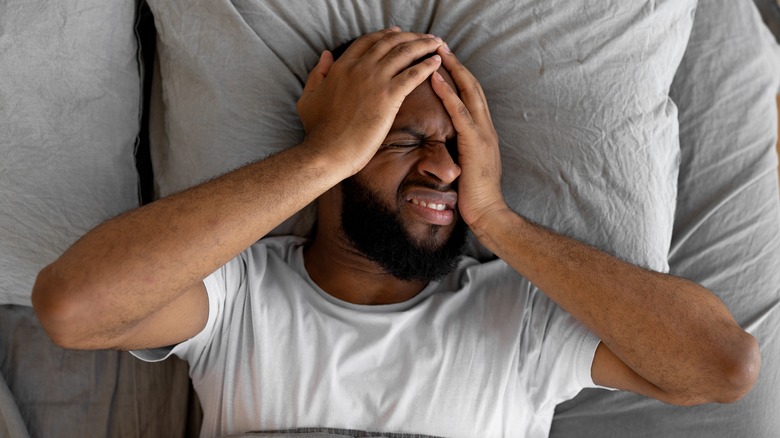Reasons Why You Are Waking Up Dizzy
Waking up in the morning isn't always easy. A lack of sleep or poor sleep quality can make your alarm clock feel like your worst enemy. But sometimes, waking up is especially difficult due to health issues and symptoms that strike in the morning.
This is a familiar problem for those who experience dizziness after waking up. According to Mayo Clinic, dizziness can range from lightheadedness to feeling like the room is spinning, commonly referred to as vertigo. It has several potential causes, including inner ear issues, low blood pressure, and nutrient deficiencies. Dizziness is common, especially among older adults, and nearly half of people visit a doctor at least once to treat dizzy spells (per the Cleveland Clinic).
Despite being a frequent sensation, however, dizziness can impact your daily life and may lead to fall-related injuries, nausea, vomiting, and other health risks and accidents. Now, if you're regularly waking up feeling dizzy, here are some common causes.
Morning dizziness can have many causes
Just like the dizziness that occurs during other times of the day, there are numerous possible explanations for morning dizziness. According to Healthline, some people get dizzy in the early hours due to changes in posture. As you first sit up or get out of bed, your body adjusts its balance to accommodate. This can cause dizzy spells as the fluid in the inner ear moves. In some cases, blood pressure can also suddenly drop upon standing, leading to dizziness, lightheadedness, and even fainting (per Medical News Today).
Experiencing dizziness before noon may also be associated with certain health conditions. A dip in blood sugar overnight, for one, can cause dizzy spells in the morning, especially for people with diabetes. Obstructive sleep apnea, where breathing is disrupted during sleep, may also trigger an off-balance feeling upon waking up. Several other conditions, including heart disease, anxiety disorders, anemia, carbon monoxide poisoning, multiple sclerosis, and Parkinson's disease may also cause dizziness and vertigo (via Healthline).
Luckily, forenoon dizziness can sometimes be alleviated with simple interventions, like staying hydrated and getting out of bed slowly, according to Mayo Clinic. For dizziness that is severe or doesn't go away, contact your doctor to check for any underlying health conditions that could be behind your a.m. wooziness.


